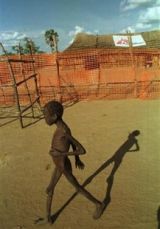UN urges support for aid operations to South Sudan
Dec 15, 2005 (UNITED NATIONS) — The January peace agreement in Southern Sudan has opened up the region to humanitarian aid after 21 years of war, but with an almost total lack of infrastructure, little Government ability to deliver services and other problems, it was critical for the international community to maintain assistance to avert a humanitarian crisis, a United Nations Relief Official said today.
 “There is a high level of expectation by the people of southern Sudan that after 20 years of war, and actually 40 years of war out of the last 50, that at last they will start to see the dividends of peace,” David Gressly, the United Nations Deputy Humanitarian Coordinator for Southern Sudan, told correspondents at a Headquarters press conference today.
“There is a high level of expectation by the people of southern Sudan that after 20 years of war, and actually 40 years of war out of the last 50, that at last they will start to see the dividends of peace,” David Gressly, the United Nations Deputy Humanitarian Coordinator for Southern Sudan, told correspondents at a Headquarters press conference today.
Those expectations would need to be managed as the Government lacked some of the basic tools to deliver, even though it had some oil revenues. However, a drop-off in humanitarian assistance in 2006 would lead to a significant reduction in basic services at a time when the region was at the lowest level of any country in Africa.
He said the United Nations had set up, as quickly as possible, its humanitarian operations, first in Rumbek, the initial southern capital. It moved to Juba in August.
In 2005, the United Nations focus had been on two critical issues, namely returns and the provision of basic services, he said. There were some 4 million people displaced from southern Sudan, of which about half a million have returned in 2005. Some 700,000 were expected to return in 2006.
“South Sudan is rather unique in the lack of support services and infrastructure available on the ground. There is almost no nothing there,” he said, speaking of roads, telecommunications and building infrastructure. “Almost all of the services provided are through humanitarian assistance provided by the international community.”
Looking to 2006, the new Government would face a number of challenges, he said. One of the more immediate ones is the current disruption caused by the Ugandan Rebel Lords Resistance Army (LRA), which was operating in a broad band in southern Sudan from the Ugandan border across to Congo.
The regional Government itself was in a very embryonic stage right now and was basically starting from scratch, he said. While the Government had set up ministries, they lacked the basic tools to carry out governmental functions, for example, treasury, procurement and payroll systems. Putting those systems in place in 2006 would remain a challenge.
The recent appeal for southern Sudan requested $560 million for the humanitarian sphere. It also projected $220 million worth of needs for recovery and development. In 2005, the UN had received half of what had been appealed. Mr. Gressly said he hoped for a greater percentage in 2006.
(Un News Centre)
